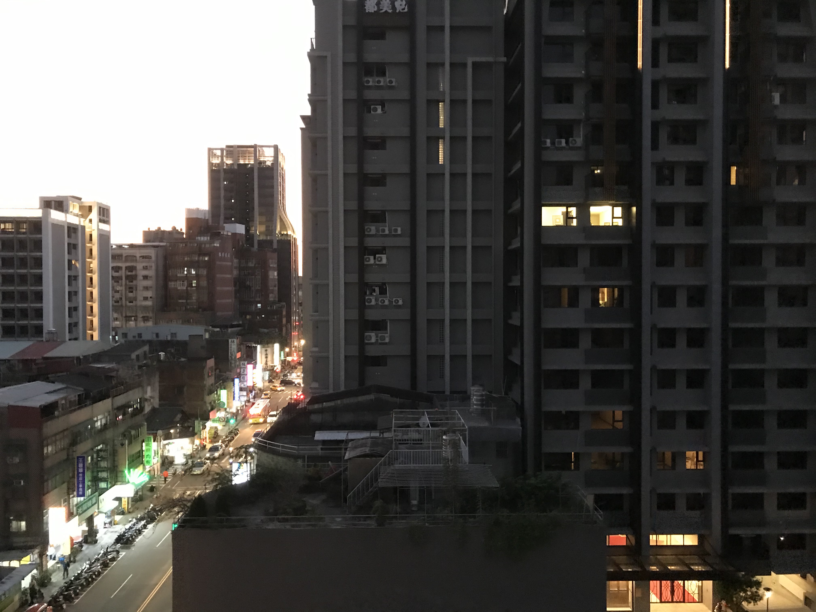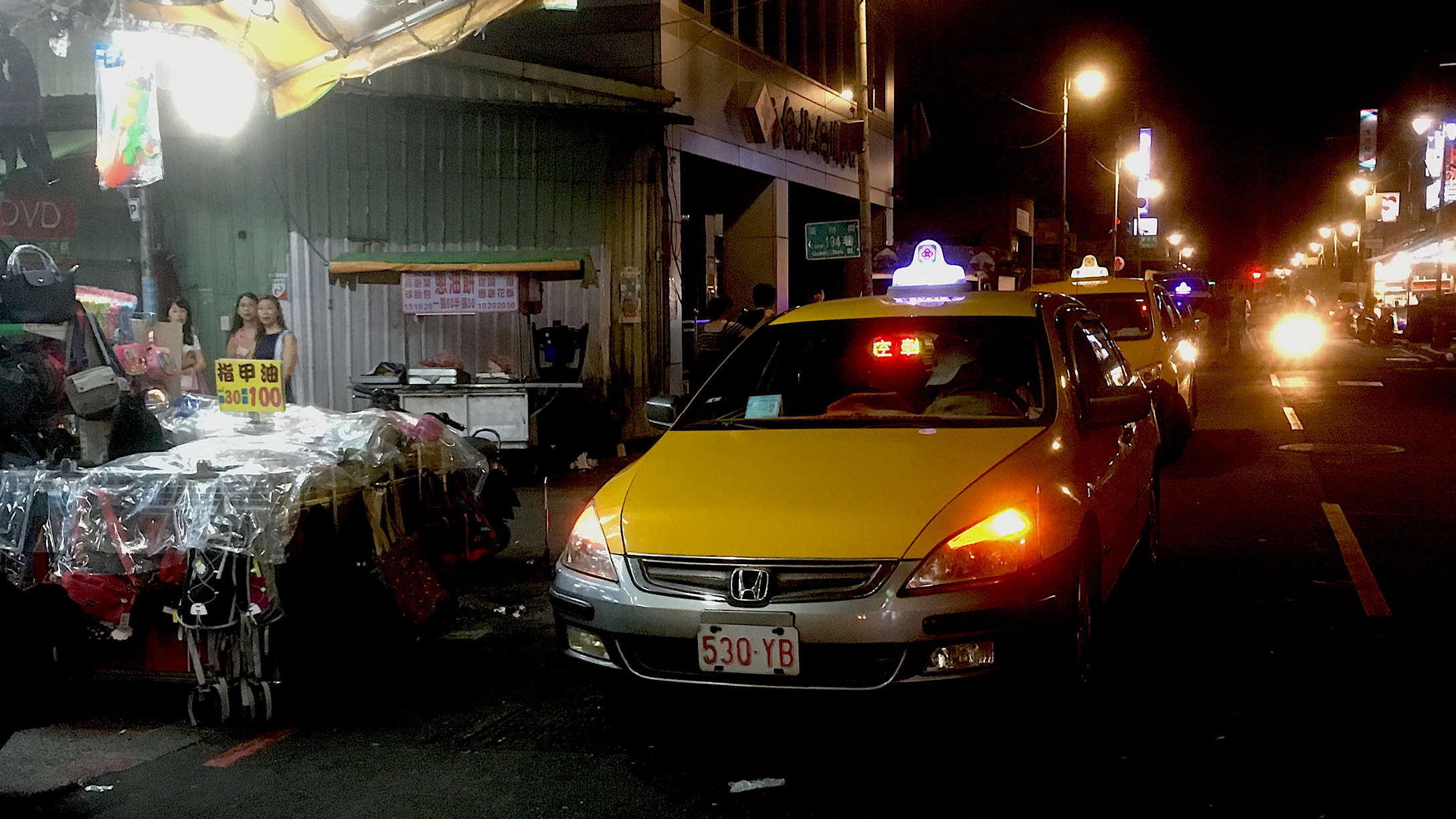Whatever they may tell you about any other city, Taipei is the real city that never sleeps. And Bangka, the district of Taipei where I’ve lived for around a year now, probably sleeps the least.
The majority of Taipei’s homeless population lives in Bangka, having originally been drawn here by the temples in the area that feed the homeless. The city government may also find it convenient to maroon the homeless in what has been historically the poorest part of the city, away from the eyes of tourists and the more affluent public.
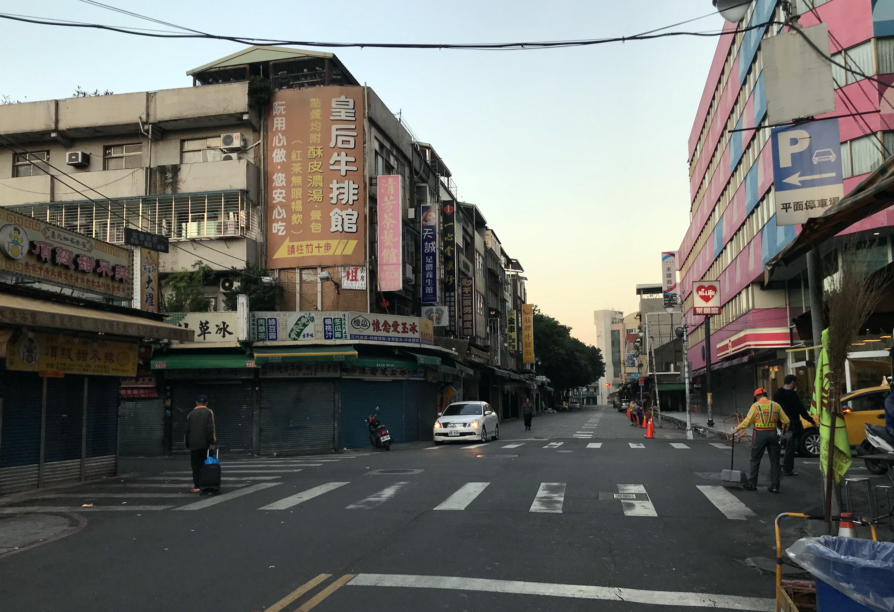
Bangka is the origin of Taipei, where the city started; it was once the site of a port. Because Taipei was originally settled by Ketagalan indigenous, Bangka was once known as the “Han People’s District.” But the city’s development eventually shifted north, to the area known as Dadaocheng in Mandarin or Twatutia in Taiwanese Hokkien, and then to the east. What had once been the center eventually became its periphery.
Taipei is a city dominated by “waishengren”—the 10% or so of Taiwanese descended from the Kuomintang who fled to Taiwan after their defeat by the Chinese Communist Party. But Bangka is ethnically split between “benshengren,” descended from earlier waves of migration from China, and “waishengren.” The area is also known by its Mandarin name of Wanhua, but many local residents refer to it by its Taiwanese Hokkien name of Bangka. It’s the only part of Taipei in which the majority speaks Taiwanese Hokkien rather than Mandarin.
Bangka is home to the humbler of Taipei’s two major red-light districts; the Linsen North Road area is decidedly more upscale. Bangka’s red-light district goes 24/7, fueling the area’s night markets and all-night eateries and shops that stay open until 6 or 7 AM, by which time breakfast shops are open.
I originally came to this part of town with plans to open an art space—plans which exploded spectacularly. The lower rents and larger spaces available here gave me the feeling I might be part of an early wave of gentrification A lot of new shops have opened up in the year I’ve lived here; it seems likely that the Bangka I know—the Bangka of everlasting night—won’t be around forever.
I’ve often told friends that the building I live in resembles the Chungking Mansions in Hong Kong. It’s a microcosm of Bangka in itself. I still haven’t been to every floor, because I want to prolong the suspense and mystery of what else might be lurking in the building. So far I know that there are offices for several obscure labor unions, a barbershop, some offices, and a love hotel.
The love hotel brings in many strange characters at night, some of them highly intoxicated. Some of my neighbors give me gangster vibe, and some are involved in the sex industry. Police have come to my building in numbers a few times, with the type of loudspeaker they use for protests, looking for someone.
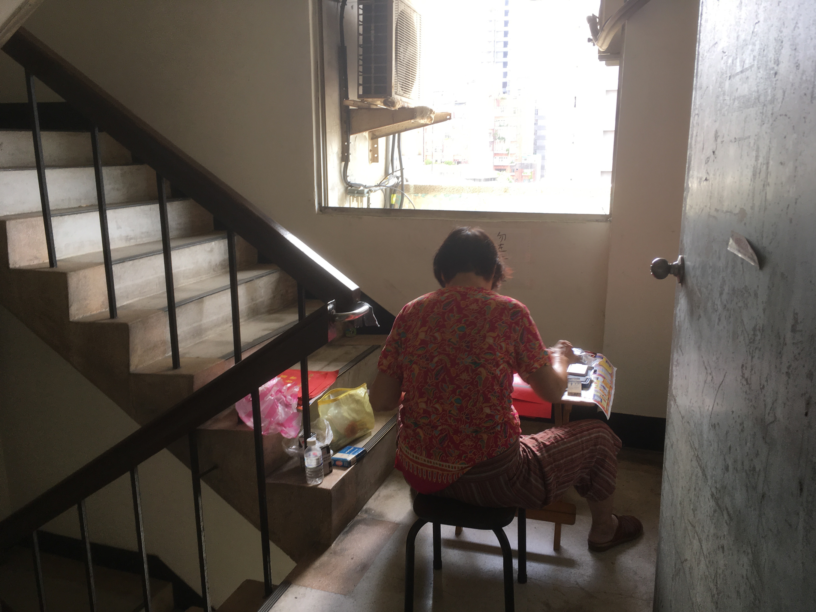
I seem to be the youngest resident of the building, by far.
One night in the elevator, an old lady whom I see every day suddenly blurted out to me, “Handsome guy [shuàigē or 帥哥, a term touts use to try and pull in male customers—not necessarily in a sexual context either, sometimes just in front of restaurants or shops]—are you looking for girls?”
She seemed to have sort of forgotten that I was her neighbor. I think she must be a professional tout, and just forgot where she was and automatically blurted this out after seeing me, a man. Since then, it’s been very awkward every time I run into her.
Across from my building there’s an alleyway of massage parlors offering sexual services. During the summer, on weekend nights, sometimes I would see eighty or ninety men standing in those alleyways. It’s quieted down since winter started, maybe in connection with a police raid in October involving over a hundred officers. Major raids occurred in March and April of last year as well.
The Laosong Elementary School is across the street from the massage parlors, and is another symbol of Bangka’s decay over the years. The school once had 10,000 students. Now there are scarcely 500.
Half a dozen or more sex workers are generally hanging around on the street when I leave my building. They call out to me in accented Mandarin, asking if I want a “massage”. Most seem to be from southeast Asia, while some are Chinese.
Local sex work organizers tell me that the sex workers in Bangka tend to be on the older side. Younger sex workers, in their 20s and 30s, favor the red-light district by Linsen North Road, an area that caters to Japanese businessmen.
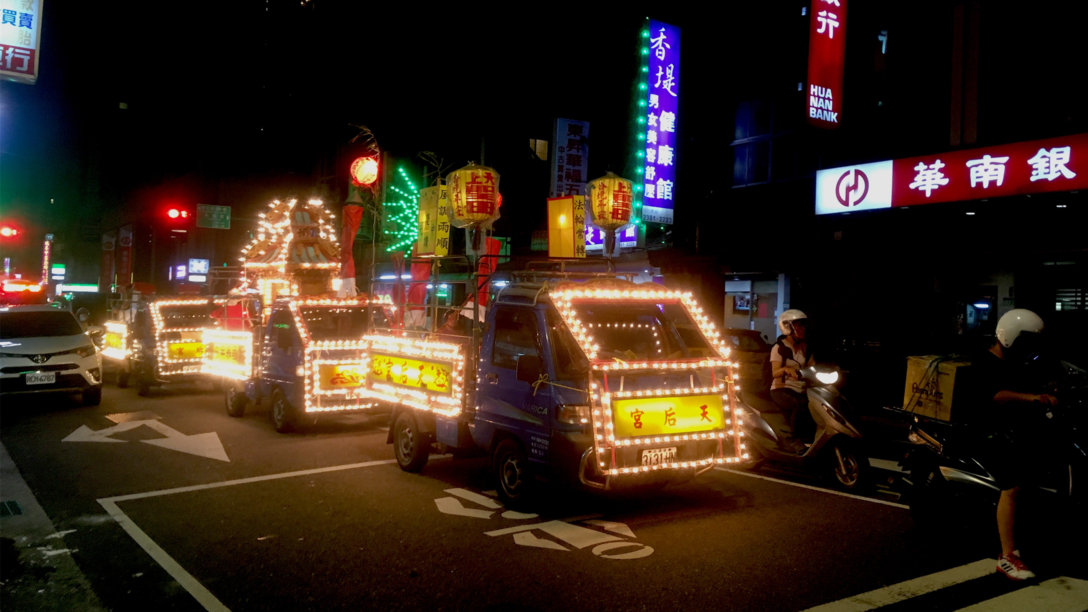
I’ve gotten to recognize some of them, because I see them at the same spot every day—often from as early as 8 or 9 AM until past midnight. The Vietnamese-seeming girl who stands across from the cell phone store seems to be a joker. She’ll often say something and I’ll see her colleagues laughing. The woman in the traditional market behind my building seems quiet, usually standing alone by the butchers’ stall during the daytime, next to the laundromat where I do my laundry.
Usually, you’ll see a few police officers patrolling the area in uniform. They seem to turn a blind eye to the sex workers. But sometimes in the morning, as I eat in the breakfast shop, I’ll hear someone shout in Mandarin, “Police! Run!” And I’ll hear the sound of heels clattering.
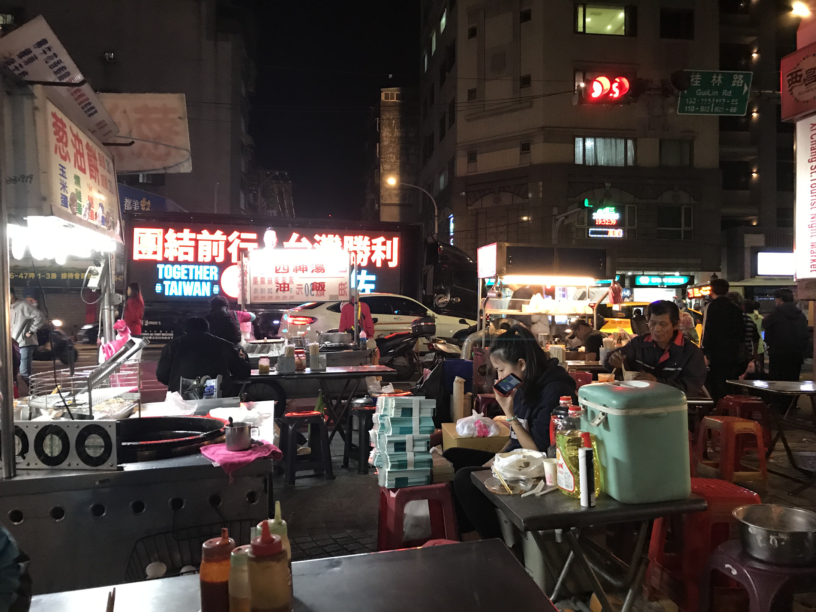
I tend to work late at night, since it’s easier to write when it’s quieter. When I go out to eat after work, sometime between 3:00 and 6:00 a.m., I often encounter gangster types in the night market.
Sometimes they’ll be stumbling out of karaoke places, drunk and in need of a meal. They’ll come into a restaurant, loud and belligerent. Since I tend to have a temper myself, there have been a few times where a gangster tried to take my seat, I didn’t want to give it up, and the owner of the restaurant had to cut in to pacify the situation. Taiwan is generally quite safe, but once I ended up stranded in a neighborhood dive bar for three hours because some gangsters got into an altercation outside, and another time at the same bar I overheard some gangsters talking about shooting people. (What shootings, I never found out.) After that, I never went back to that bar again—it seemed too dangerous.
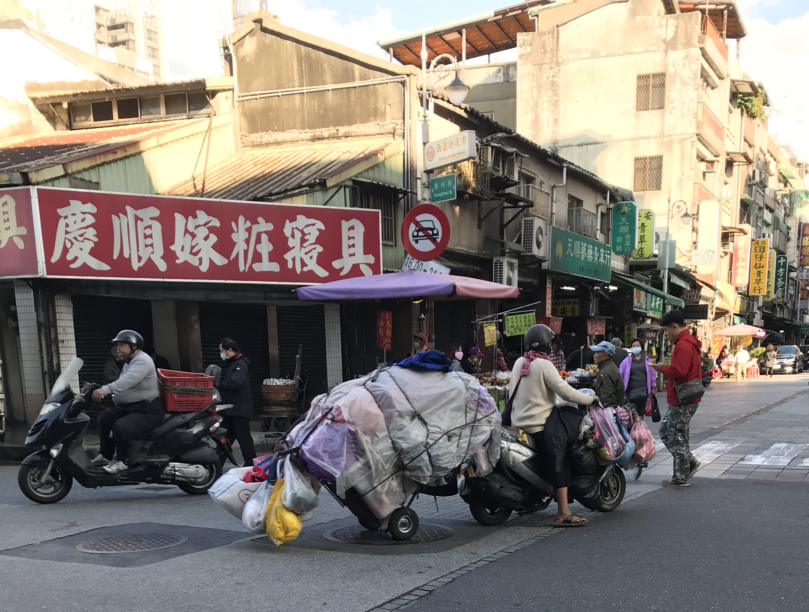
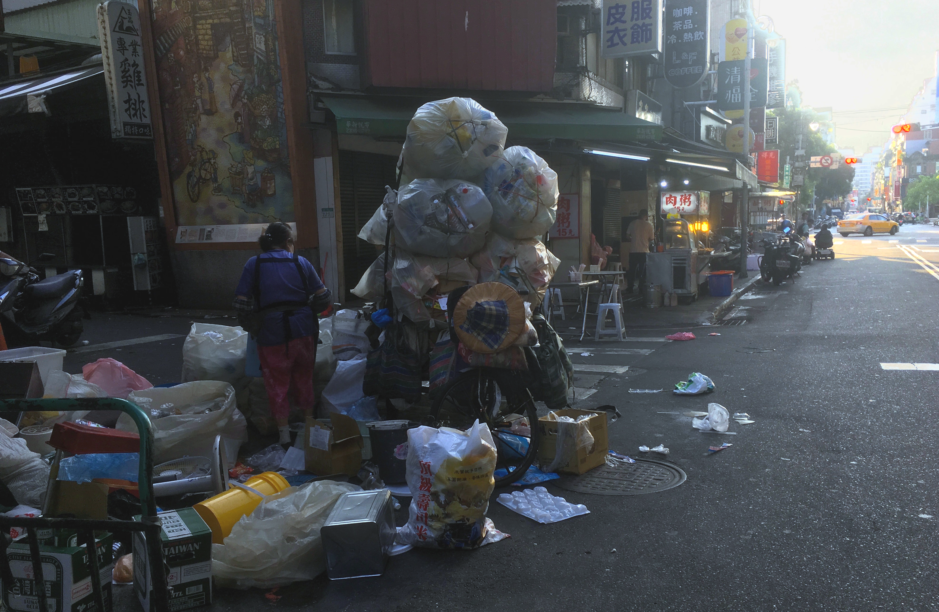
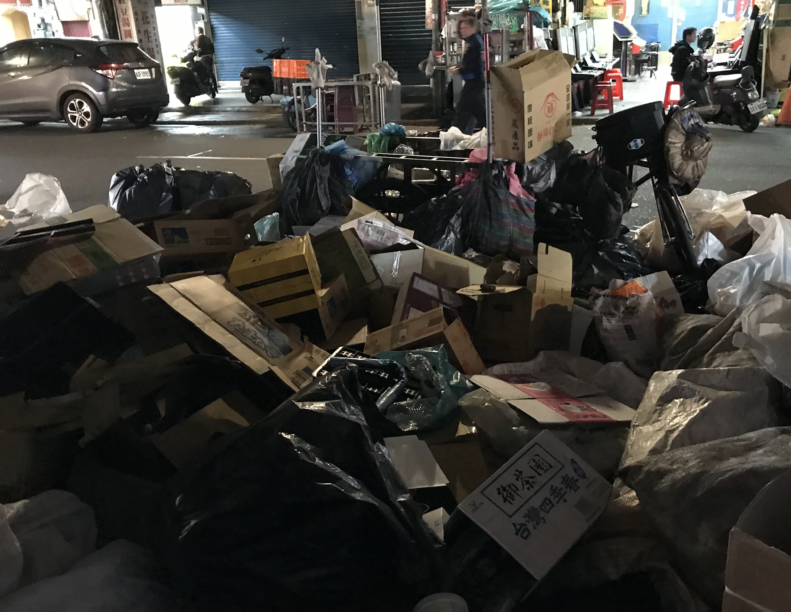
You’d be surprised at how much garbage piles up in Bangka during the night, in the night market and elsewhere. Every day, people leave random garbage in front of my apartment building. I’ve found expensive bottles of kaoliang, benches, doors, bicycles, once a toilet, and once a mysterious coffin-like object (probably a closet). There’s also an underground market in the night market that starts setting up at noon. This is mostly homeless people selling odd bits of stuff they’ve gathered during the day—from Buddhist statuary to children’s toys—to whom, I don’t know.
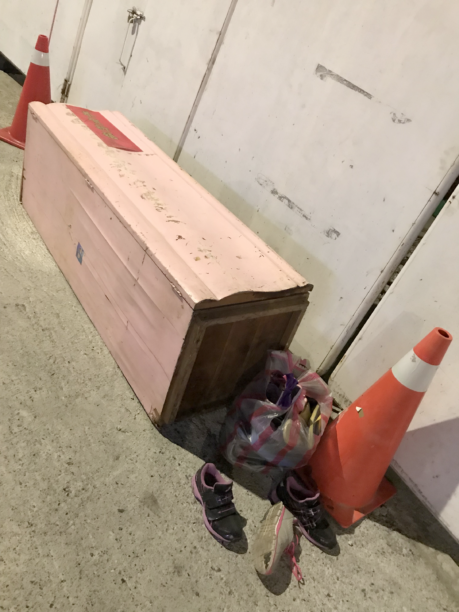
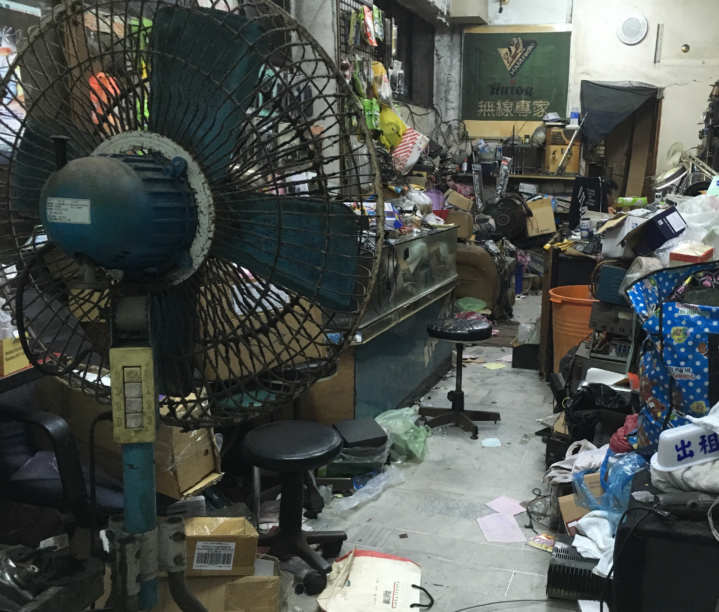
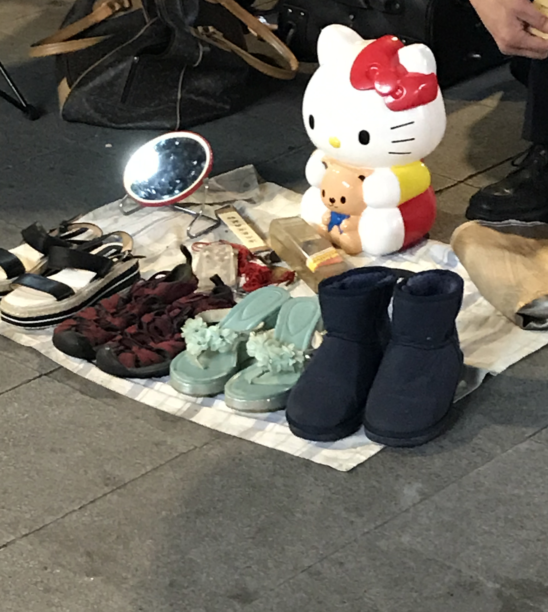
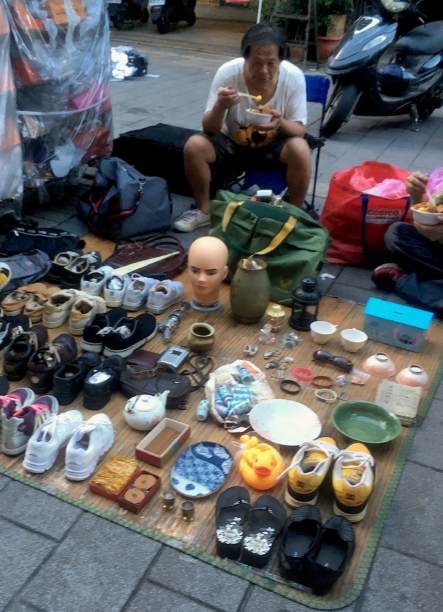
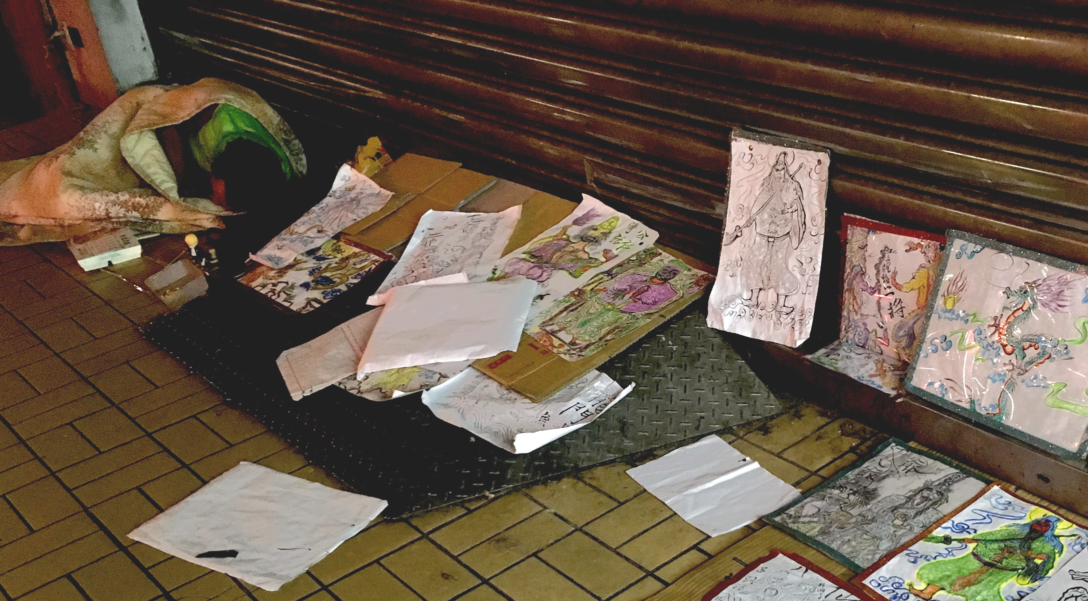
Sometimes, wandering the market, you can smell burning ketamine. Or see homeless people stumbling around in a state of confusion with a plastic bag—glue sniffers. By the park around Longshan Temple, you’ll see the homeless gathered, sometimes idly playing mahjong, or listening to a radio. There’s two homeless artists I pass by on a nearly daily basis, one who does sketches, and the other who does calligraphy. Bangka also has a number of temples. Sometimes I’m woken up in the morning by noisy temple festivals setting off firecrackers, blasting temple music, or even electronic music, some temples in Taiwan having incorporated electronic music into their temple dances.
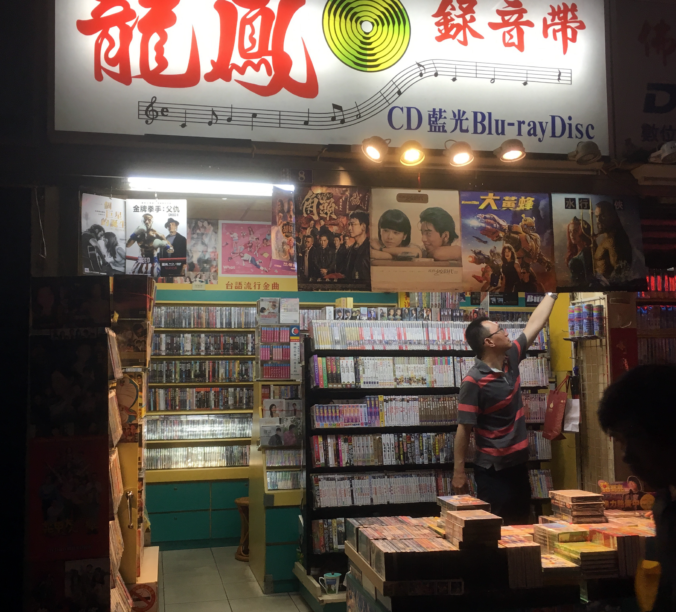
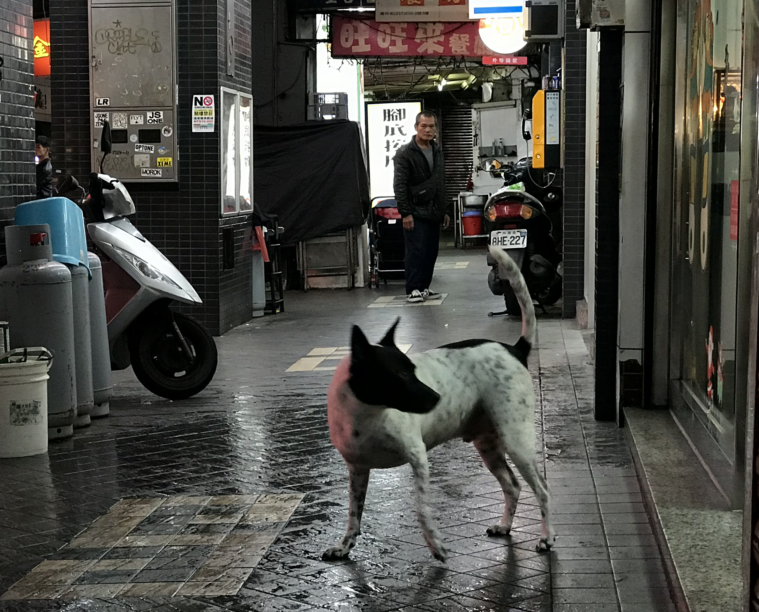
I always eat at the same stall in the Guangzhou Street night market, which sets up after midnight every day and is open until just before 6 AM. It’s incredibly cheap, 60 NT (around 2 USD) for a large set meal of braised pork rice, vegetables, and an egg. I always order the same thing, so they know me by now. The prices have probably never changed in sixty years or so, despite inflation. A lot of the customers seem to be just getting off of work when I’m eating there. Or maybe they’ve come from a karaoke parlor, it’s a habit of manual workers that work through the night to drink around 7 or 8 AM, when they get off their shifts. Sometimes I’ll see someone passed out at a table.
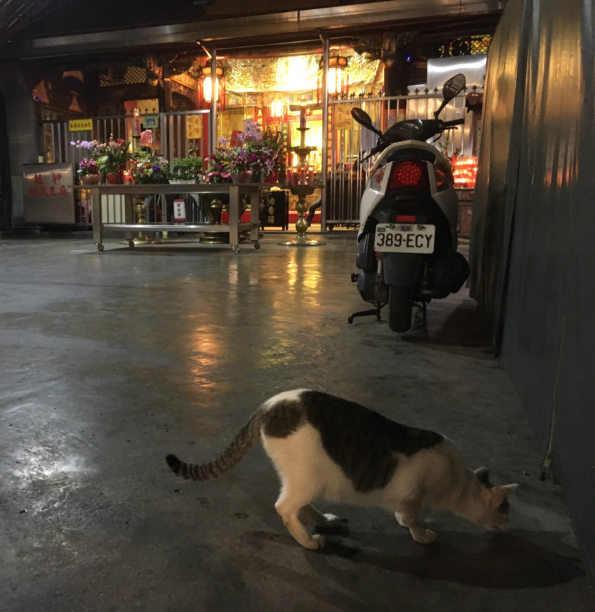
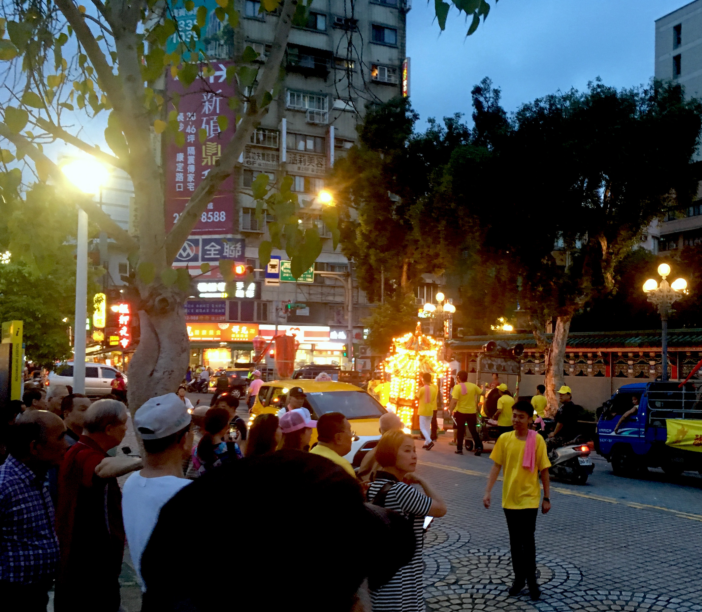
The convenience store clerks that work the night shifts all tend to look like they’ve seen some shit. The most bizarre customers just seem to phase by the clerk on duty.
This was one such exchange that I saw last December:
[Man walks into the convenience store, walks up to the desk]
Man: “Wait! Don’t call the ambulance!”
[Convenience store clerk ignores him]
Man: “Let me ask you!”
[Continues to be ignored, man walks up to him]
Man: “I’ll ask you here! …That bag I bought just now, it’s called a ‘plastic bag’, is it not?”
Clerk: “Yes.”
Man: “It comes in small, medium, and large sizes, does it not?”
Clerk: “Yes.”
Man: “The bag I bought just now was a medium-size, was it not?”
Clerk: “Yes.”
Man: “How much was it?”
Clerk: “Five NT.” [about 17¢ USD]
Man: “Thank you.”
[Man leaves store]
I can only surmise that this man was a confused time traveler sent to the past to retrieve plastic bags from the dystopian future.
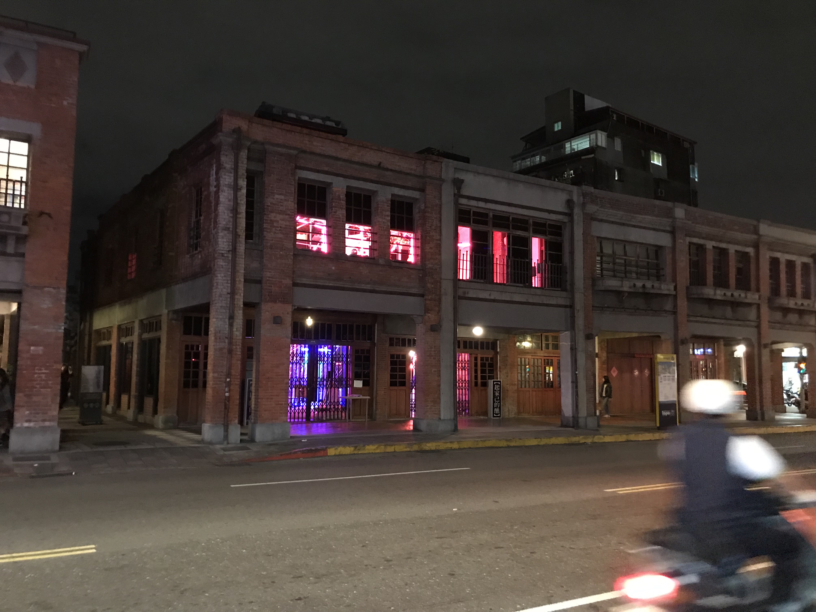
There are so many Bangka encounters I’ll never be able to explain. I saw a man walk into a 7/11 and shout, “Handsome guys! Beautiful women! 929 is broken! Thank you for your patronage!” Then he turned and left.
Another time I saw a clean-cut man in a pristine white sailor uniform sitting on the curb next to my usual 24/7 beef noodle place. Next to him was large plastic bag full of pornographic DVDs, presumably bought at one of the many video stores or sex toy shops nearby. He was sitting there drinking alone.
Many of the Taipei-based killings during Taiwan’s White Terror took place in the area, with execution grounds in southern Bangka. They say that during the events of the 228 Massacre in 1947, the waters of the Tamsui River ran red with blood, and many dead bodies were floating in the river.
Still, the Kuomintang has historically been strong here, in part because a lot of retired military veterans live in the area; the military in Taiwan constituted a political elite during authoritarian times, so the military has tended to support the Kuomintang. However, it is sometimes the case that areas in which the Kuomintang’s political persecution was the heaviest tend to vote Kuomintang. That’s trauma, I guess.
So there was an upset in Bangka in 2016, when symphonic death metal musician and social activist Freddy Lim, frontman of Chthonic and a founding leader of the New Power Party (NPP), defeated twenty-year-incumbent Kuomintang legislator Lin Yu-fang. Lin tried to use Lim’s death metal music background against him, attempting to depict him as a drug user and sexual deviant. But it didn’t work. Lim credited his victory, in part, to his popularity with the older, middle-aged housewives who had seen him as a judge on variety shows. He went on to win reelection in 2020.
Now and then I’ve run into Lim, whom I’ve interviewed a few times, randomly standing in front of my apartment building. It’s always a bit surprising.
Though I’m part-waishengren and part-benshengren, my family generally thinks of themselves as waishengren (identifying more strongly with the ethnic group with the higher class position). So the Taipei depicted in, say, the films of Edward Yang resonates strongly with me. My family is from Guling Street, for example, the setting of his iconic A Brighter Summer Day (whose Chinese title is more directly translated as “The Youth Murder Incident on Guling Street”). But there’s more to Taipei than that; the depiction of Taipei, whether in Yang’s films or other films set in Taipei, tends to slant waishengren.
So it was personally a bit significant for me to move to Bangka. I moved from the most affluent and upscale area of the city, the Daan-Xinyi area—where my family is from—to the poorest and oldest part of the city. From another perspective, moving from Daan to Bangka meant moving from the place where all the White Terror victims were buried to the place where they were killed.
I guess part of my motivation was to try living in a place that was more heavily benshengren.
When I first moved, I spent many nights just wandering for hours, soaking in all the streets, alleyways, and sights. I made an especially concerted effort to grasp the totality of the Bangka night. I might walk around from 12 AM to 2 AM every day for one week, and 4 AM and 6 AM the next.
As it is now, Bangka seems like a city in a city, completely different from the rest of Taipei. But I know that someday it’ll disappear, replaced by 7/11s and FamilyMarts and Starbucks and the same urban homogeneity seen in the rest of the city. But for now, for a while at least, I can still experience these strange, beautiful nights.
